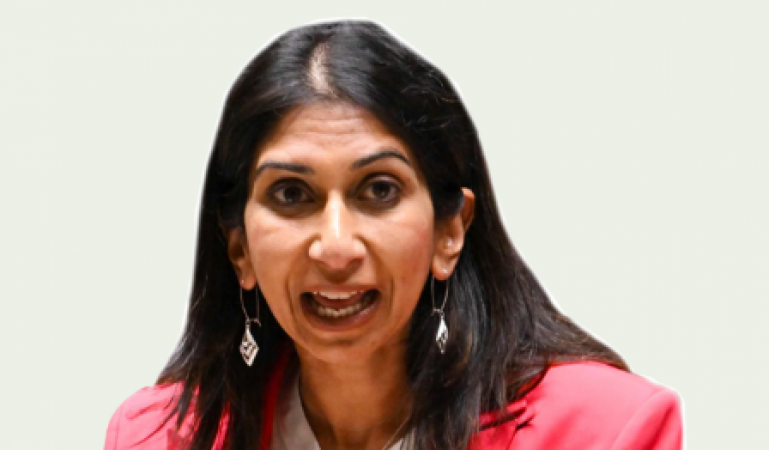
Lagos: Deborah Okunawo, 28, travelled with her husband to the UK from Nigeria last year on a study visa, which made settling down easier.
Okunawo and thousands of others were forced to "japa," which is a word that means "to flee" in the Yoruba language, due to Nigeria's unpredictable academic calendar, which is marked by frequent and protracted university strikes, economic difficulties, and rising insecurity.
"Migrating to a new country can bring up different challenges, like cultural shocks and loneliness," said Okunawo, a postgraduate student at the University of Lincoln in eastern England.
Also Read: Antony Blinken plans a trip to Beijing that had been delayed for June 18
I have a shoulder to lean on when my best friend is nearby. Tosin, her husband, is also able to work and provide for the family.
However, Nigerians who aspire to follow in their footsteps have recently had their plans complicated.
Restrictions will be in place starting next year, including those preventing family members from travelling with international students enrolled in non-research postgraduate programmes, as the UK government is eager to reduce net migration, which has reached record highs.
Also Read: NHK: Haneda Airport in Tokyo's collision of two planes results in no injuries
British Home Secretary Suella Braverman stated last month that "we have seen an unprecedented rise in the number of student dependents being brought into the country with visas."
Nigerian students were not specifically mentioned by the London government, but the number of Nigerians coming to the UK to pursue postgraduate degrees and visit family has increased dramatically in recent years.
According to the UK's Office for National Statistics, the number of Nigerian nationals studying in the UK increased from 6,798 in 2017 to 59,053 as of December 2022.
The number of dependents increased along with those numbers: in 2019, there were 1,586, whereas there were 60,923 last year.
According to the ONS in February, "by nationality, Nigeria saw a significant increase in the proportion of sponsored study-related visas granted to dependents, from 19 percent in 2019 to 51 percent in 2022."
There are rumours that the new measures are intended for Nigerian students and students who are already studying in the UK.
Foreign postgraduate students, according to immigration hardliner Braverman, used the study route as a "backdoor to work," and their families applied "untenable" pressure on Public services
Her firm stance aligns with the Conservative government's pledge to "take back control" of the nation's borders after the nation leaves the EU.
The strategy has coincided with a rise in net immigration as well as labour shortages brought on by Brexit in industries like agriculture, hospitality, healthcare, science, and IT.
In addition, international students contribute to the British economy by paying high tuition fees.
According to London Economics, a politics and economics consultancy, they generated nearly $42 billion ($52 billion) in revenue in 2022 while costing the government £4.4 billion.
Before she and her husband left for the UK, Busayo Olayiwola, a 33-year-old quantity surveyor in Ibadan, southwest Nigeria, said that most students and their dependents "pay tax, national insurance (contributions to the health system) without access to any public funds."
Foreign students also bring in a lot of revenue for the nation, according to Olayiwola.
No statement was made by the British government regarding whether Nigerians were its main target.
A spokesperson however stated that immigration regulations "continue to be kept under constant review to ensure they support the UK's excellent academic reputation."
High rates of poverty, a faltering economy, and Nigeria's 33.3 percent unemployment rate have made Britain an expensive choice for students, even those from middle-class families.
However, experts claimed that the new limitations might benefit the nation's economy in the upcoming months.
Nigeria might see a "uptick in remittances" from its students in the UK without dependents.
Subomi Plumptre, CEO of Lagos-based investment company Volition Capital, speculated that these people might feel a greater need to support their families financially as a result of having to leave them behind.
Some prospective postgraduate students in the commercial hub Lagos and the capital Abuja said they were looking into postgraduate options in nations like Canada as a result of the restrictions, though some Nigerians are also turning elsewhere.
In 2021, more than 15,000 Nigerians received permanent residence permits in Canada, compared to 4,400 five years earlier.
Also Read: Security forces in Somalia end hotel siege that was reported by Al-Shabab
Wale Oni, a Nigerian professor at the University of Salford in northwest England near Manchester, hopes that the Nigerian government will take a cue from the limitations and put more effort into halting the "brain drain."
You see UK universities advertising their programmes in the major cities and luring Nigerians in with alluring offers like post-study work visas and chances to bring their dependents," he said.
What initiatives does the Nigerian government have in place to buck the trend, though?